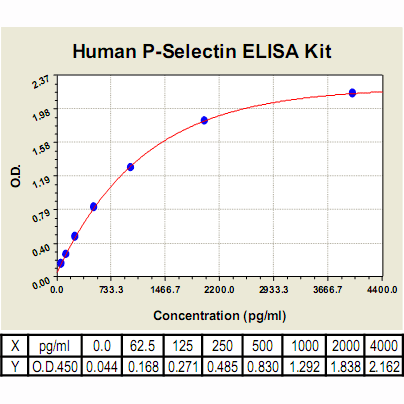Product Sheet CL0505
Description
BACKGROUND P-selectin (CD62P), the largest of the selectins, with a mass of 140kDa, extends approximately 40nm from the endothelial surface. Previous names include granule membrane protein 140 (GMP-140) and platelet activation dependent granule external membrane protein (PADGEM). It is a component of the membrane of the alpha and dense granules of platelets, and also of the membrane of the Weibel–Palade bodies of endothelial cells. In common with the other selectins, P-selectin has an N-terminal lectin domain, an epidermal growth factor motif, (generally) nine regulatory protein repeats, a transmembrane section and a short intracytoplasmic tail. Using P-selectin knockout mice, the importance of P-selectin-mediated cell adhesive interactions in the pathogeneses of inflammation, thrombosis, growth and metastasis of cancers has been clearly demonstrated.1
On inflammatory and thrombogenic challenges, P-selectin rapidly translocates to the surface of these cells and contributes to the weak adhesion of leukocytes to stimulated endothelial cells and the heterotypic aggregation of activated platelets to leukocytes. A principal leukocyte ligand for P-selectin is P-selectin glycoprotein ligand 1 (PSGL-1), a disulfide bond-linked homodimer, with each subunit having a molecular weight of about 120 kDa. It is expressed on a variety of human leukocytes, including neutrophils, monocytes, certain subsets of T lymphocytes, eosinophils, and basophils. On neutrophils, PSGL-1 localizes to the tips of the microvilli. Several studies of the PSGL-1 knockout mice have demonstrated that PSGL-1 is critically required for neutrophil rolling and migration mediated by P-selectin. PSGL-1 is the best-characterized selectin ligand that has been demonstrated to mediate leukocytes rolling on endothelium and leukocytes recruitment into inflamed tissue in vivo. In addition to its direct role in leukocyte capturing, PSGL-1 also functions as a signal-transducing receptor.2 In addition, cross-linking of PSGL-1 by P-selectin also primes leukocytes intracellularly for cytokine and chemoattractant-induced beta2-integrin activation for firm adhesion of leukocytes. Furthermore, P-selectin mediates heterotypic aggregation of activated platelets to cancer cells and adhesion of cancer cells to stimulated endothelial cells.3
P-selectin, released from the cell surface, circulates as a soluble molecule in the plasma. It was shown that soluble P-selectin (sP-selectin) can exert procoagulant activity and it might therefore play an important role in thrombosis and acute coronary events. sP-selectin is often used as a marker of platelet activation.4
On inflammatory and thrombogenic challenges, P-selectin rapidly translocates to the surface of these cells and contributes to the weak adhesion of leukocytes to stimulated endothelial cells and the heterotypic aggregation of activated platelets to leukocytes. A principal leukocyte ligand for P-selectin is P-selectin glycoprotein ligand 1 (PSGL-1), a disulfide bond-linked homodimer, with each subunit having a molecular weight of about 120 kDa. It is expressed on a variety of human leukocytes, including neutrophils, monocytes, certain subsets of T lymphocytes, eosinophils, and basophils. On neutrophils, PSGL-1 localizes to the tips of the microvilli. Several studies of the PSGL-1 knockout mice have demonstrated that PSGL-1 is critically required for neutrophil rolling and migration mediated by P-selectin. PSGL-1 is the best-characterized selectin ligand that has been demonstrated to mediate leukocytes rolling on endothelium and leukocytes recruitment into inflamed tissue in vivo. In addition to its direct role in leukocyte capturing, PSGL-1 also functions as a signal-transducing receptor.2 In addition, cross-linking of PSGL-1 by P-selectin also primes leukocytes intracellularly for cytokine and chemoattractant-induced beta2-integrin activation for firm adhesion of leukocytes. Furthermore, P-selectin mediates heterotypic aggregation of activated platelets to cancer cells and adhesion of cancer cells to stimulated endothelial cells.3
P-selectin, released from the cell surface, circulates as a soluble molecule in the plasma. It was shown that soluble P-selectin (sP-selectin) can exert procoagulant activity and it might therefore play an important role in thrombosis and acute coronary events. sP-selectin is often used as a marker of platelet activation.4
REFERENCES
1. Frenette, P.S. & Wagner, D.D.: Thromb Haemost. 78:60-4, 1997
2. Moore, K.L. et al: J. Cell Biol. 128:661-71, 1995
3. Bird, M.I. et al: Biochem Soc Trans. 25:1199-206, 1997
4. Ridker, P.M. et al: Circulation 103:491-5, 2001
2. Moore, K.L. et al: J. Cell Biol. 128:661-71, 1995
3. Bird, M.I. et al: Biochem Soc Trans. 25:1199-206, 1997
4. Ridker, P.M. et al: Circulation 103:491-5, 2001
Products are for research use only. They are not intended for human, animal, or diagnostic applications.
Details
Cat.No.: | CL0505 |
Target Protein Species: | Human |
Range: | 62.5pg/ml – 4000 pg/ml |
Specificity: | No detectable cross-reactivity with other cytokines |
Storage: | Store at 4°C. Use within 6 months. |
ELISA Kits are based on standard sandwich enzyme-linked immunosorbent assay technology. Freshly prepared standards, samples, and solutions are recommended for best results.
Products
| Product | Size | CAT.# | Price | Quantity |
|---|---|---|---|---|
| Human P-Selectin ELISA Kit: Human P-Selectin ELISA Kit | Size: 96 wells | CAT.#: CL0505 | Price: $517.00 |

